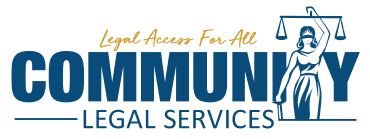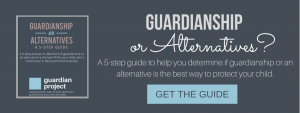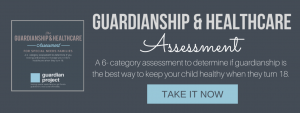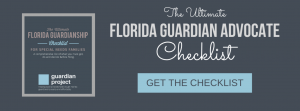Becoming a Guardian Advocate for a Person with a Developmental Disability
When any child turns 18, their parents or caregivers lose their legal right to make decisions on behalf of that child.
Some children who have a developmental disability — such as autism, Down syndrome or cerebral palsy – may not be able to manage certain areas of their life, like healthcare or deciding where to live, without assistance.
For those children, it may be in their best interest for parents or caretakers to retain the legal right to continue to make these decisions after the child’s 18th birthday. Parents and guardians of a child with a developmental disability can do this by becoming the child’s “guardian advocate.”
Becoming a guardian advocate requires a legal proceeding where a judge removes certain rights from an adult child with a developmental disability (for example, the right to manage healthcare) and assigns those rights to a caring parent or caretaker. As compared to the general guardianship process (referred to as “plenary guardianship”), the process for becoming a guardian advocate has been set up specifically to meet the needs of people with developmental disabilities.
Click here for a comprehensive guardian advocate FAQ that answers the 20 most common questions asked by parents and caretakers about becoming a guardian advocate.
What Are Your Rights?
- Dignity and to be treated humanely;
- An attorney and to access courts;
- Have annual and continuing reviews by the court;
- Be educated;
- Receive visitors and communicate with others; and
- Privacy.
- Enter into a legal contract;
- Sue and defend lawsuits;
- Apply for government benefits;
- Manage property or to make any gift or disposition of property;
- Determine residence;
- Consent to receive medical and mental health treatment; and
- Make decisions about their social environment or other social aspects of life.
- all the district courts in Florida,
- all the court-approved guardianship classes, and
- all the application forms.
- The child must be over the age of 18.
- The child must be able to make some but not all of the decisions to care for their own person or property.
- The child must have a developmental disability, which means they must have one of the following:
- The condition must have begun before the child turned 18.
- The disability is a substantial handicap that is reasonably expected to continue indefinitely.
- Be at least 18 years old or older;
- They should not have a personal issue (untreated mental illness or addiction, or disability) that would make them unfit to serve; and
- They cannot have committed a felony or been judicially or administratively determined to have engaged in abuse, neglect or exploitation of a child or elderly person.
- A child will be on their own to make important medical decisions and to deal with doctors and insurance companies.
- Parents and caretakers can only “participate” in the child’s healthcare, they cannot make any final decisions (which will be made by the child once they turn 18).
- Your child can revoke a parents or caretakers authority to participate at any time.
For an adult child with a developmental disability who cannot fully manage all areas of their life independently, becoming their guardian advocate is the most effective way to keep them safe. This is particularly true in the case of children who are susceptible to suggestion, or who are not capable of managing healthcare independently.
But the process of becoming a guardian advocate involves the removal of some of your child’s basic human rights and the reassignment of those rights to another person. It’s a serious undertaking and careful consideration should be given as to whether there are other, less restrictive options to meet the safety needs of your child.
This is not meant to dissuade you from becoming your child’s guardian advocate. After carefully considering alternatives to guardianship and doing a full evaluation of their child’s needs, the vast majority of parents ultimately decide that becoming their child’s guardian advocate is the best decision for their family.
To help you get started, use this 5-Step Guardian Advocate Guide to decide whether becoming a guardian advocate, or using an alternative to guardianship, is the best way to protect your child when he or she turns 18.
For parents and caretakers of a child with a developmental disability who is turning 18, it can be a challenge to get all the information about becoming a guardian advocate that’s needed to make a fully informed decision about whether guardian advocacy is the best way to protect your child when he or she turns 18.
Here is an easy-to-read infographic about the benefits and risks of becoming a guardian advocate.
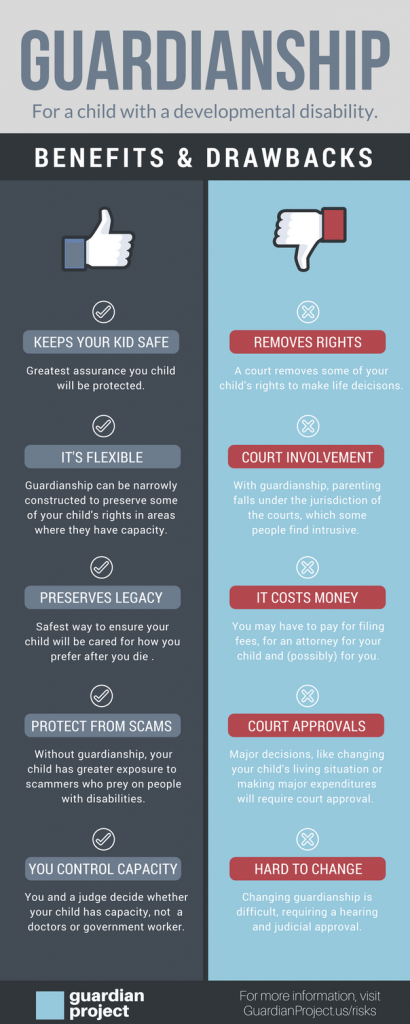
A person with a developmental disability has many rights that can never be taken away, including, but not limited to the rights to:
Some rights can be assigned to a guardian advocate. These include the right to:
The person who wants to become a guardian advocate, or their attorney, completes an application packet and files all the required paperwork with the probate division of the district court in the county where the child resides. Some of the additional documents required with this filing include a credit report, criminal background check, medical diagnosis for the child, and a copy of a recent IEP or other care document prepared by a government (or government monitored) agency.
Once all the paperwork has been filed, the court will appoint an attorney for the child. After the attorney meets with the child, a court date can be set to determine whether the application will be approved.
Once an application is approved, the applicant must complete a guardianship training class (make sure you go to the class approved by the court in your district).
Download this free Guardian Advocate Checklist for a list of everything you will need to get, do, and decide prior to filing your application, plus get links to:
Becoming a guardian advocate is not the same as getting a power of attorney. Watch this video to understand why, and to find out why you may not even be able to use a power attorney to help care for a child with a developmental disability.
There are certain requirements that a child must meet to qualify for the guardian advocate program.
Here’s an overview of these requirements:
A diagnosis for either cerebral palsy, autism, spina bifida, Down syndrome, Phelan-McDermid syndrome, or Prader-Willi syndrome.
-or-
A diagnosed disorder or syndrome that is attributable to intellectual disability (I.Q. score below 70).
-or-
An IQ score below 70 and the child’s functional age is below what the reasonable standard is in the community where that child lives.
In Florida, there are no special tests that you have to pass to become a guardian advocate. Applicants should meet the following qualifications:
Your guardian advocate status will only be effective once your child turns 18. However, you can file your guardian advocate application with the court a few months before your child’s 18th birthday, and have letters signed once your child turns 18.
One major thing to consider is that if you file before your child turns 18, the ability to pay costs and fees (which includes the cost of the court-appointed attorney for the child) is based on the applicant’s income and assets. Unless you meet the very stringent income and asset requirements, the applicant is responsible to pay these fees.
On the other hand, if you file the application after your child turns 18, ability to pay is based on your child’s income and assets, which are likely below the poverty line. This means the court will waive filing fees and will cover the cost of your child’s attorney.
In all guardian advocate proceedings, the court automatically appoints an attorney to represent the person with a developmental disability (who is referred to as the “ward”). The ward has the right to substitute their own attorney for the one the court appoints.
The attorney for the ward may not also serve as that person’s guardian advocate, and they may not represent the guardian advocate or the person applying to become a guardian advocate.
If you file your application before your child’s 18th birthday, you will be responsible for the cost of the court appointed attorney, unless you also qualify for civil indigent status, in which case the state will pay for this expense.
For parents of a child with a developmental disability, planning for the possibility that their child lives beyond their life is a frequent source of anxiety. The good news is that becoming your child’s guardian advocate is one of the best ways to make sure that your child is not only cared for, but will remain protected, should you die.
As the guardian advocate, there are two ways you can plan for the care of your child. First, a co-guardian can serve along with you. Often this is the child’s other parent or a family member. The good thing is that if you (or the other) co-guardian is unable or unwilling to serve, the other co-guardian can continue alone.
There are some very serious complications that arise when there are co-guardians. So before you decide to move forward in that direction, take a look at this article that discusses the benefits and risks of co-guardian advocates.
Second, a “standby guardian advocate” can be appointed to take your place should you die. This person is approved by the court to serve as your successor guardian advocate if you can no longer serve. The standby guardian advocate has no official duties until your death or resignation as the guardian advocate, at which time the standby would notify the court and take over for you as the primary guardian advocate.
When it comes to deciding whether or not to become a guardian advocate, the most important area where you need to consider whether or not a child with a developmental disability needs help is healthcare — because the consequences can mean the difference between life and death.
Becoming a child’s guardian advocate after he or she turns 18 is the only way to retain full legal authority to participate in the child’s healthcare.
If you do not get guardianship, after a child turns 18:
Under Florida’s expedited guardian advocate process, in most cases, you are not required to hire an attorney.
However, if your child has assets beyond social security benefits or other government payee programs, then you will be required to hire an attorney.
For example, if your child is involved in a lawsuit where there is a potential for a financial settlement, if he or she is a beneficiary of an estate, or if he or she has other income, property or assets held in their personal name, then an attorney would be required. If your child is merely the beneficiary of assets held for their benefit in a supplemental or special needs trust, then you are not required to hire an attorney.
Once your guardian advocate application is approved, you and the child will fall under the permanent jurisdiction of the court. Unless waived by court order, you will need to file annual reports with the court, and possibly may need to get the court’s permission to make material changes in the initial plan you will submit to the court (i.e., if you want to use the ward’s assets to make a large expenditure).
This may seem like an imposition, but it’s really a minimal intrusion. Most people report that, after becoming their child’s guardian advocate, life basically returns back to normal.
Parents and caretakers often wonder what will happen if they become a child’s guardian advocate, and subsequently there is a material improvement in their child’s condition. For example, if scientists discovered a miracle drug or cure that restores a child’s intellectual capacity. Could their child’s rights be restored?
The simple answer is yes. If there is some change in a child’s condition such that they develop the ability to make decisions for him or herself in certain areas, then the guardianship can absolutely be modified to restore some or all of her or her rights.
In Section 393.12(12) of the Guardians Advocate Statute you will find guidance on the restoration of rights in a Guardian Advocate case.
What Do You Need to Do?
- You file the petition with the Circuit Court in the county where the person with a developmental disability resides.
- There are multiple forms and additional records that must be filed with the petition. This information may include, but is not limited to:
- An application for each person applying to be guardian advocate and standby guardian advocate;
- An oath;
- The applicant’s credit report;
- An IEP or other governmental care plan; and
- A physician’s report.
- Explain that a court hearing is scheduled to decide the person with the developmental disability’s ability (also known as “capacity”) to make decisions about their rights, as stated in the petition;
- List the date of the hearing; and
- Inform the person with the developmental disability that they have the right to be represented by legal counsel of their own choice, and that the court will provide a representative at the beginning of the hearing.
- The person with a developmental disability is allowed to be present at the hearing unless the applicant can show good reasons to exclude them.
- The person with a developmental disability also has the right to remain silent, present evidence for self-sufficiency, call or cross-examine witnesses, and have the hearing open or closed. A closed hearing is one that is not publicly available through the court docket.
- The court will consider all the relevant reports related to the person’s disability, such as the person’s current individual family or individual support plan, the individual education plan, and other professional reports documenting the condition and needs of the person.
- The nature and scope of the person’s lack of decision-making ability;
- The exact areas in which the person lacks ability to make decisions about care and treatment services or basic requirements for their physical health and safety;
- The specific legal disabilities to which the person with a developmental disability is subject;
- The name of the person selected as guardian advocate and the reasons for the court’s selection; and
- The powers, duties, and responsibilities of the guardian advocate.
Sometimes with all the stress that can come with deciding whether or not a child needs a guardian advocate, we forget to take the child’s wishes into consideration.
Becoming someone’s guardian advocate is a big decision that involves the removal of that person’s rights. To the extent that this is possible, it’s important to get the child’s feedback, and for them to feel included in this decision. It’s their life, so they may have something to say about your plans.
It’s also prudent to consult with your family, because it’s never good to make an important decision like this on your own in a vacuum.
At the end of the day though, as a parent, you have to do what’s right for your family and the child. Ultimately, whether or not to apply to become a guardian advocate will be your decision to make.
Whether you hire a lawyer or apply to become a guardian advocate without one, it’s a really good idea to get a solid checklist to work from.
Here’s a secret about getting guardianship: No one task in the application process is that difficult to manage. But for most applicants, what is challenging is the volume of materials that needs to be prepared.
Having a good checklist, like this one from the 18th Judicial Circuit or the Ultimate Florida Guardian Advocate Checklist are good places to start.
Also, you will want to start to accumulate the forms that you will need to file with the court. Whether you or an attorney completes these forms, ultimately, the responses will have to come from you. So it’s a good idea to get the information you will need to respond in advance.
The 7th Judicial Circuit Court in Volusia County has a great forms packet. You can also find downloadable forms in Microsoft Word format on the 18th Judicial Circuit Court’s website.
If you get a copy of the Ultimate Florida Guardianship Checklist, you will have a list of every document that you will need to apply to become a guardian advocate.
It’s best to start planning how you will accumulate this information early because, for certain items, you will need them to be dated within six months of filing your application materials with the court.
For example, you will need a copy of your child’s IEP (Individualized Education Program). This may require you to assemble your child’s IEP team to have a meeting to get a more recently dated version, which may take a while to schedule.
The same requirement applies for the physician’s report. Keep in mind that some physicians will require you to do a checkup visit in order for them to sign off on the report, and it can take several weeks to get an appointment with some doctors.
Also, if you were ever arrested, you may need to get certificates of disposition of your case from the charging court, and this can take some time, particularly if the records are old and stored in archives.
The cost to apply to become your child’s guardian advocate can vary from as little as $200 to $7,500 or more, depending on when you file (before or after your child’s 18th birthday) and whether or not you hire a private attorney.
Even if you or your child qualifies for civil indigent status and your court costs and your child’s attorney fees get paid by the state, you will still be responsible for certain minimal expenses, including the cost for a background check and fingerprinting, and the cost for the guardian advocate training course to the extent your attendance does not get waived by the court.
The further in advance you decide how you will file (with or without an attorney) and when (before or after your child’s 18th birthday), then you can start to set money aside, easing the financial burden on your family and making sure that getting appointed as guardian advocate by the court won’t be unnecessarily delayed because of finances, putting a child who needs a guardian advocate at risk of harm by not having one.
Parents and guardians who plan to file without a lawyer experience much less stress and anxiety about the process when they have someone to help them through the process.
There may be someone at your child’s school who is familiar with the application process, or you may have a friend who has been through the application process. At some point through the process you will have questions, and having someone to lean on will make things much less stressful.
One place to find help is GuardianProject’s website, which has free and low-cost resources you can take advantage of, including its free Facebook guardianship support group where parents can ask questions about guardianship and get answers from their peers and experts, and its Online Guardianship Workshop, that will teach you exactly how to file on your own and manage your guardian advocate obligations for years to come.
To become a guardian advocate, you must start a court proceeding and submit your application. You do this by filing a “petition,” which you will find in any set of guardian advocate forms.
A notice that the petition has been filed must be given to the person with a developmental disability both verbally and in writing (in the person’s language and in English).
A notice must also be mailed to the next of kin (parents and adult siblings) any health care surrogate appointed through an advance directive, any agent under a durable power of attorney, and anyone else the court decides is necessary.
The notice must:
The court will set a date for the hearing after the petition is filed. Timing will depend on how busy the court is, but it typically takes between four to six weeks.
After the hearing, if the court finds that the appointment of a guardian advocate is necessary, they will issue an order stating this decision along with the facts and conclusions that support it and give you your “Letters of Guardian Advocate,” which is the paperwork you will use to demonstrate to other people that you are the legally appointed guardian advocate.
The court order will include:
Consider applying for benefits from the Social Security Administration, Medicaid, and the Agency for Persons with Disabilities.
What to Consider Before Taking Action?
- What is the relationship between the potential guardian advocate and the person with the developmental disability? Do they have a personal motivation to keep this person’s short-term and long-term best interests in mind?
- Has the potential guardian advocate proven themselves to be reliable and responsible in other related areas, such as finance, healthcare, or personal relations?
- Has the potential guardian advocate demonstrated mental and emotional stability, and are they at risk of harmful behavior such as substance abuse or criminal activity?
- What are the qualities your ideal guardian advocate would possess, and does your potential guardian advocate measure up?
One of the most important things you will need to decide is when you will file your guardian advocate application with the court.
For some of you, this decision will be easy. If your child is already 18 or older, you will file your application as soon as it’s completed.
If your child is under the age of 18, see the video below, because you’ve got to make a big decision.
Often in a case where an adult child with a disability has two parents, both want to serve as guardian advocate together. Any time two or more people serve as guardian advocates together, the courts refer to this arrangement as co-guardian advocates.
In Florida, there’s no rule against co-guardian advocates. But as a general rule, most lawyers do not recommend it because of the high probability of deadlock that may need to be resolved by the court.
Disagreements between co-guardians often come up when dealing with highly emotional issues like residential placement, medication, and end of life decisions. Resolving deadlock through a protracted court proceeding can result in significant cost and potential damage to the child.
One possible solution is to have one parent be the primary guardian and the other be the standby guardian (a person who is pre-approved by the court to automatically take over if the primary guardian is unable or unwilling to serve).
Another solution is to have one person be the guardian advocate of the child’s person, exclusively handling things like healthcare and living arrangements, and the other person be the guardian advocate of the child’s property, exclusively handling all financial affairs.
Despite the potential for very serious challenges, with two people who have a good working relationship and overwhelmingly agree about the care of a child with a developmental disability, a co-guardian advocate arrangement could be just fine.
For more information, see this complete article about the benefits and risks of co-guardian advocates.
A stand-by guardian is a person who is qualified by the court to become the guardian automatically when and if the primary guardian or co-guardians can no longer serve.
The wonderful thing is that, if something happens to the primary guardian(s), there will be somebody who can pick things up instantaneously. The standby guardian becomes the primary guardian advocate immediately upon the original guardian advocate’s resignation or death.
A standby guardian is highly recommended, especially if you do not plan to have a co-guardian. It gives you the opportunity to choose who will stand in your place if something ever happens to you.
If your plan is to appoint a standby guardian immediately, you would submit their application along with yours.
It’s prudent to think about who would be the best person to serve as your child’s guardian advocate or standby guardian advocate. Here are some things to consider:
The nice thing about the guardian advocate process is that it’s possible to assign to the guardian advocate only those rights that your child needs to safely manage their life. So, if a child can manage their living situation but needs help with healthcare, it’s possible to become guardian advocate only in that area.
Use this 5-step system to figure out what areas your child may need help.
This being said, in the vast majority of guardian advocate cases, if a child with a disability requires a guardian advocate at all, they require it in all areas.
You are only required to hire an attorney to file your guardian advocate application if part of the assistance your child needs involves handling the child’s property or assets beyond social security benefits or other government payee programs.
But just because you don’t have to hire an attorney does not mean proceeding without one is the best decision for your family situation.
It’s important that you weigh the cost savings by not hiring a lawyer with the cost of the time it will take to learn how to navigate the guardian advocate application process, and the stress that most parents experience when having to deal with the court on their own.
An in-between solution might be taking a class like this one that will teach you how to prepare and file your guardian advocate application on your own, or one that might be offered through your school district or local ARC.
Guardian advocate information from the 9th Judicial Circuit Court: https://www.ninthcircuit.org/sites/default/files/GAInstructions.pdf
The Social Security Administration’s Disability Benefits page: https://www.ssa.gov/benefits/disability/
The Florida Department of Children and Families Individual with a Disability page: https://www.myflfamilies.com/about/additional-services-offices/office-civil-rights/individual-disability
The Florida Agency for Persons with Disabilities: https://apd.myflorida.com/
Guardian Advocate Glossary: https://www.guardianproject.us/florida-guardianship-glossary-list
For information on the rights of students with disabilities, visit the CLS page on Students’ Rights.
